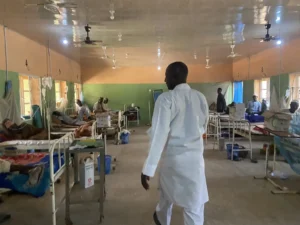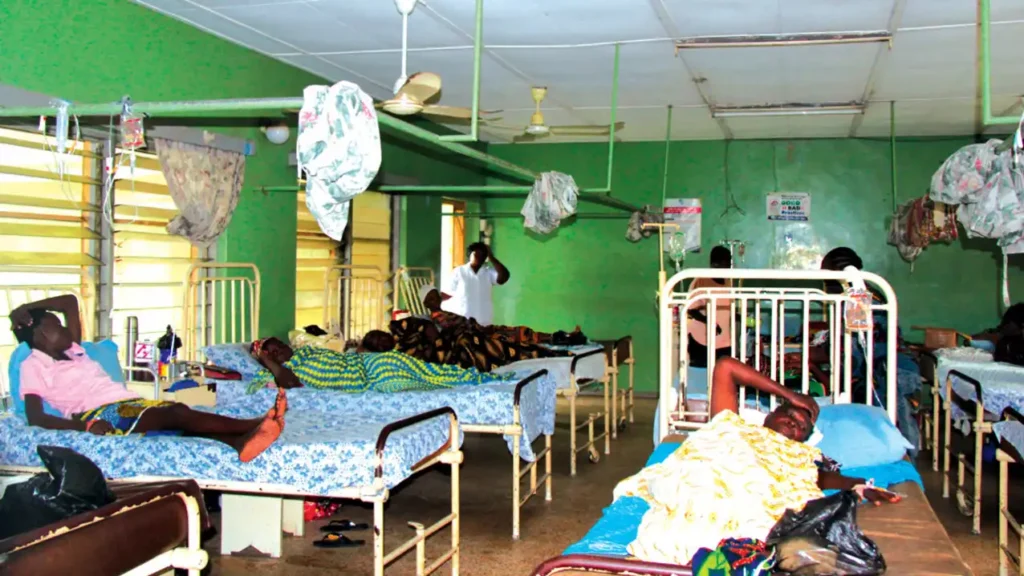Once regarded as a symbol of medical excellence and colonial-era achievement, the oldest hospital in Lagos now stands as a crumbling edifice—representing the slow decay of Nigeria’s public healthcare system. Established over a century ago, the facility served as a top-tier center for health services in Nigeria’s commercial capital. However, years of neglect, inadequate funding, and poor maintenance have reduced it to a facility barely able to meet modern healthcare standards.
Rusting beds, leaking roofs, non-functional air conditioning units, and outdated diagnostic equipment have become commonplace across wards. The hospital’s once-pristine buildings are now stained with mold and rot, while waiting rooms remain overcrowded with patients who endure long hours—sometimes days—just to access basic care.

A Human Resource Crisis: Doctors Burned Out, Nurses Overstretched
Beyond the crumbling infrastructure, the human capital that sustains healthcare delivery has also been severely compromised. A significant number of healthcare professionals have left the hospital due to poor remuneration, harsh working conditions, and lack of career progression. For those who remain, long shifts, inadequate resources, and constant exposure to emotional and physical stress have left morale at rock bottom.
According to staff testimonies, even simple medical procedures are often delayed due to lack of consumables. Emergencies go unmanaged, surgeries are postponed, and diagnostic services frequently grind to a halt for lack of power or supplies. These conditions not only endanger patients but also create an unsafe and frustrating work environment for medical professionals.
Lagos: A State of Wealth with a Healthcare Crisis
Ironically, this hospital sits at the heart of Lagos State—Nigeria’s richest, most populous, and economically vibrant region. With a GDP larger than most West African countries, Lagos has the financial muscle to invest in world-class health infrastructure. Yet, less than 8% of its budget is allocated to health—far below the 15% Abuja Declaration benchmark agreed upon by African Union nations.
Experts point out that much of Lagos’s public spending is skewed toward infrastructure, real estate development, and mega-projects, while social sectors like health and education receive minimal attention. This misalignment in priorities has left the city with glossy highways and commercial towers but crumbling hospitals and underfunded schools.
Public Health at Risk: A Growing Burden on the Poor
The hospital’s failings disproportionately affect low-income Lagosians who cannot afford the soaring costs of private healthcare. As a result, many resort to self-medication, unlicensed chemists, or traditional healers—often with fatal consequences. This breakdown in accessible public health has contributed to increased mortality rates, treatment delays, and preventable complications in chronic and emergency cases.
Additionally, the failure to invest in primary and preventive healthcare has increased the burden on referral hospitals, many of which are already overrun and lacking capacity. The result is a vicious cycle of underperformance, disrepair, and public mistrust.
Experts Call for Urgent Intervention
Healthcare analysts, civil society groups, and medical unions have repeatedly called for systemic reform. Their recommendations include:
-
Increased healthcare budget allocations at both state and federal levels
-
Comprehensive infrastructure rehabilitation programs
-
Improved salaries and incentives for health workers to curb brain drain
-
Investment in modern medical equipment and technology
-
Transparent monitoring of health expenditures and procurement
-
Stronger partnerships with private sector and development agencies
They argue that until policymakers treat healthcare as a critical pillar of national development—rather than a token budget line—facilities like this historical hospital will continue to deteriorate, with devastating consequences for public health.
Conclusion: A Symbol of What’s Broken—and What Must Be Fixed
The decline of Lagos’s oldest hospital is not just a localized tragedy—it is a reflection of Nigeria’s broader health sector crisis. In a state flush with economic potential, the inability to provide basic, quality care for its citizens underscores a troubling disconnect between governance and public welfare.
Without deliberate, well-funded, and sustained intervention, the state’s most vulnerable residents will continue to suffer. And as long as iconic institutions like this remain in ruins, the message is clear: Nigeria’s health sector is in urgent need of healing—starting from the very foundations.






